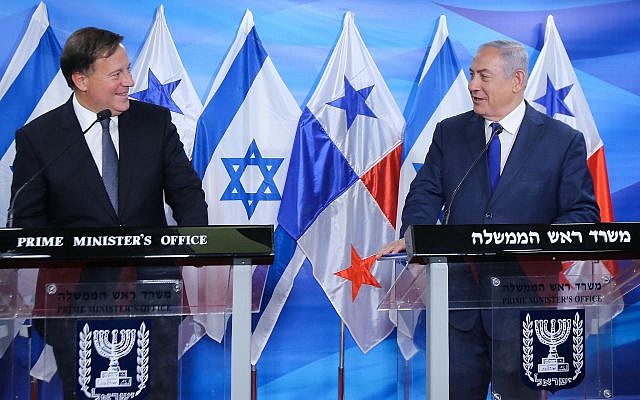Panama has no plans to relocate its embassy from Tel Aviv to Jerusalem even though it holds that west Jerusalem is part of Israel, its President Juan Carlos Varela told The Jerusalem Post.
“Panama is keeping the embassy in Tel Aviv,” said Varela, whose three-day trip to Israel from Wednesday to Friday was sandwiched between the more high profile ones from the leaders of Guatemala and Paraguay, who both opened Jerusalem embassies in the last week.
Panama says not opening a Je ne of only four Latin American nations that have not recognized Palestine as a state. It was one of the 37 nations that supported Israel’s admission to the UN in 1949.
It has, however, no intention of making history twice by following in Guatemala and Paraguay’s footsteps with regard to a Jerusalem embassy.
But Varela readily acknowledged that west Jerusalem is part of Israel when asked what country he was sitting in at the time of the interview.
“I am in Israel,” he said.
It was no idle statement on his part. In November, Panama was one of only nine countries that abstained on a UN General Assembly resolution that disavowed Israeli sovereignty over the city.
A Jerusalem embassy opening, Varela said, should only happen within the context of a renewed peace process between Israel and the Palestinians.
“We think the restart of the peace dialogue is the most important step that must be taken at this moment. To see the Palestinian leaders sitting with the Israeli leaders in a dialogue with the participation of the international community, we feel is most important,” he said.
“There will be time to take decisions on the embassy,” he added.
Such talks would be different from those in the past, said Varela, as he explained that the era of solely US-brokered negotiations was over.
“I do not see a Camp David taking place again,” said Varela, in a reference to the US-led talks under American president Bill Clinton in 2000.
“The peace talks with the Palestinians should include many countries so that everyone can feel that [the peace process] is supported by the international community,” he said.
The Panamanian president was hesitant to speak of his vision of what the contours of a two-state solution would look like or whether its borders should be the pre-1967 lines.
“I will push for a two-state solution and let both parties decide what will be the outcome of the peace,” Varela said. “Peace is more important than everything else at this moment.”
With respect to the 102 Palestinian deaths (according to Hamas) during riots against the IDF along the Gaza border in the last several weeks, Varela said that Israel should be more careful in its use of lethal force.
But “we also understand that a country has a right to defend itself.”
This is particularly true given that Hamas has fired rockets against Israel and kidnapped its soldiers, Varela said.
He spoke with the Post on Friday morning, before his country became one of 14 nations that abstained in Geneva on a United Nations Human Rights Council vote to create a commission of inquiry into the Gaza border violence.
The resolution condemned only Israel and did not speak of its right to self-defense.
“We are not looking for a resolution that condemns Israel,” Varela said. “Panama won’t support a resolution that doesn’t include the right of Israel to defend itself… No country in the world would allow thousands of people to cross the border without any control.”
During his visit, Varela met with both Prime Minister Benjamin Netanyahu and Palestinian Authority President Mahmoud Abbas.
He spoke with Netanyahu about the 1994 explosion of the Alas Chiricanas Airlines Flight 901 en route from Colon to Panama City.
All 21 people on the commuter flight, 12 of whom were Jews, were killed in the explosion.
Among them was a friend of Varela who was a member of Panama’s Jewish community. The two men had been roommates when they studied at the Georgia Institute of Technology.
Last year, Netanyahu sent Varela a letter that confirmed Hezbollah was behind the attack. Upon his return to Panama, Varela said, he plans to ask the authorities to reopen their investigation into the attack. The downing of the plane occurred just one day after a bomb in the Buenos Aries Jewish community center – the Argentine Israelite Mutual Association (AMIA) – killed 85 people and wounded more than 300 others.
“As the head of state and as a human being I would like the case to be reopened so justice can be done for him [his former roommate] and his family,” Varela said.
He spoke warmly about the role that the more than 14,000-member Jewish community has played in his country’s history.
“They have been a key part in the success of our country. In the economic and social development of Panama, there have been many important members of the Jewish community. They have done a lot for our country,” Varela said.
Israel and Panama have a strong relationship and burgeoning economic ties. During Varela’s visit he signed a free-trade agreement between the two countries. As a result of the trip, Israel plans to build its second largest agricultural center abroad, modeled on the one it has in India. It will be the first of its kind in Latin America and will feature Israeli innovative technology.
Israel is also helping Panama with water organization and technology.
Varela said his trip was very emotional.
“Our relationship is not just between countries, and governments, it is between our people,” he said.
